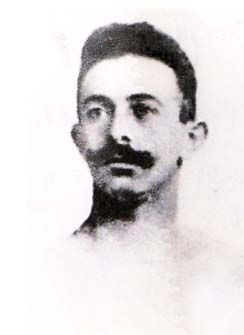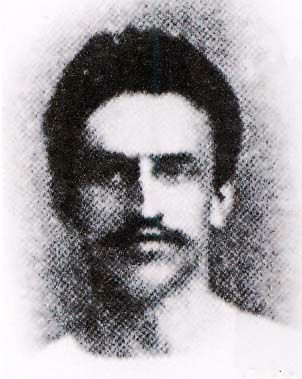Gustav and Alfred Flatow
Cousins Gustav and Alfred Flatow represented Germany at two Olympic Games, and won six medals between them. Both Gustav and Alfred were murdered in the Terezin ghetto.

Alfred Flatow was born in 1869 in Danzig, Prussia (today Gdansk, Poland). His cousin Gustav Felix Flatow was born some six years later in the adjacent city of Berent (today Kościerzyna, Poland). Gustav and Alfred represented Germany at the first modern-era Olympic Games, held in Athens in 1896. Gustav also represented Germany at the Paris Olympics four years later.
Alfred won the gold medal in the individual parallel bars event and the silver medal in the individual horizontal bar competition. He also won two gold medals as part of the gymnastics team on parallel bars and horizontal bar. In addition, he represented Germany in the 100m sprint, high jump, pole vault, long jump, triple jump and shot-put, and also in various gymnastics events. Prior to his Olympic career, Alfred was a gymnastics instructor and competed in light athletics and weight-lifting tournaments. Post Olympics, he wrote books on gymnastics.
Alfred's cousin, Gustav Flatow, won two gold medals as part of the gymnastics team on parallel bars and horizontal bar. He also competed in other categories, including light athletics and rings, and served as pacemaker in the cycling competitions. Gustav represented Germany again at the Paris Olympics, in artistic gymnastics and the individual all-around.

It is apparent from his Terezin ghetto prisoner card that Gustav was a reserves soldier (Landsturm) in the German Army in World War I. Like Alfred, Gustav also lived in Berlin in later years, and traded in textiles for a living.
With the rise of the Nazi party to power in Germany in 1933, Gustav fled to the Netherlands. Alfred, who was active in gymnastics organizations and was a member of the German Olympic Committee, remained in Germany. In 1936, Alfred was removed from the Olympic Committee on account of being Jewish. However, in the run-up to the Berlin Olympics in 1936, a tribute ceremony was arranged for German Olympic medalists, to which Alfred was invited. In 1938, as Nazi persecution gathered momentum, Alfred also moved to the Netherlands.
In 1940, Germany invaded the Netherlands. Gustav was given an exemption from wearing the Yellow Star in recognition of his Olympic achievements. When the deportation of Dutch Jews began, Gustav went into hiding. Alfred was caught and deported to the Terezin ghetto on 3 October 1942. He perished there in December 1942, at the age of 73.
In late 1943, Gustav was also caught. Senior German and Dutch sports figures protested his arrest, among them Kurt Doerry, his fellow German teammate at the 1896 Olympic Games, but in February 1944, Gustav was deported from the Westerbork transit camp in the Netherlands, to Terezin. As a result of the dire conditions in the ghetto – starvation, overcrowding and disease – Gustav perished in January 1945. He was seventy years old.
Gustav's wife, Margaret née Lam, who was ten years his junior, was deported with him on the same transport, and survived the Holocaust.
Gustav and Margaret had two children: Annie Amelia Beatrice (b. 1908) and Stefan Siegbert (b. 1916). Annie was murdered in May 1944. Stefan was deported to Terezin together with his parents, and survived. Annie was named Amelia after Gustav's mother. On 12 June 1942, 81-year-old Amelia was deported from Berlin to Terezin, on a transport carrying fifty elderly Jews. She perished there in September 1942.
In 1996, the German Postal Authorities issued a postage stamp in memory of Alfred and Gustav Flatow, to mark the 100th anniversary of the modern-era Olympic Games. In 1997, the Berlin Municipality named a section of the Olympic Stadium in Berlin, a road and a sports hall after the Flatow cousins.
